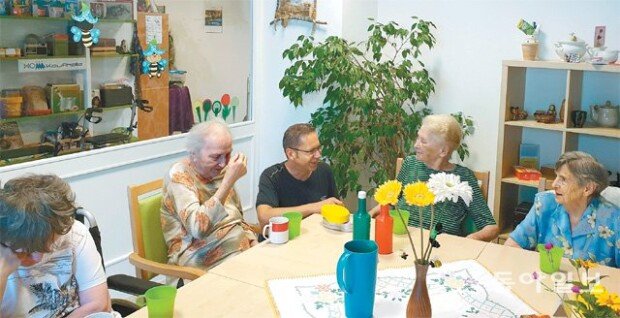Novel dementia treatment introduced at a nursing home
Novel dementia treatment introduced at a nursing home
Posted August. 31, 2019 07:21,
Updated August. 31, 2019 07:22

On a summer day in late June, eight senior citizens gathered at a “memory room” in the AlexA Residence for Senior Citizens in Dresden, Germany. White ceramics, which used to be famous in socialist East Germany, and Russia’s Matryoshka dolls were placed at a corner cupboard. The senior citizens sat around the table in the center of the room, but did not make conversations. All were patients suffering from dementia. A program of the 1960s was played on the vintage radio.
“Do you know what this is for?” As soon as Gunter Wolfram, the director of the nursing home, showed them a yellow plastic lunch box, the residents’ eyes sparkled. A female patient opened her mouth. “I used to put buttered bread in that box.” Other resident said, “I had a steel lunch box that looked the same.” As the elderly began talking, Wolfram led the conversation with a smile.
The AlexA Residence, home to some 250 senior citizens, is currently operating three “memory rooms” to help treat dementia patients. The rooms are filled with mementos from the communist East Germany in the 1960s and 1970s. Mr. Wolfram explained that such old appliances and tools help the dementia patients retrieve older memories. The nursing home’s management has bought such items at antique markets or borrowed them from the DDR Museum in Dresden. When an old brazier was placed in the nursing home, the elderly came to explain how to use it to young staffers, he said.
It was back in 2014 that Mr. Wolfram, who started working in 2007, came up with the idea of creating the “memory room.” Nursing home patients needed only his assistance in performing daily tasks, but their cognitive ability got worsened over time to a level that required a new approach, he said.
He first came up with setting up a movie theater for the residents to show them films from the 1960s and 1970s. Mr. Wolfram later added a special item to the setting: A 1960s motor scooter he bought for 1,000 euros at an online auction. The scooter displayed in the corner of the makeshift cinema has gained more attention than the film, the director said.
The residents, who were suffering from memory losses, started talking about their own experiences with the scooter, like how much they desired to own it and when they rode it with a girlfriend when young. It was extremely unusual for Alzheimer’s patients to converse with one another, so Mr. Wolfram searched for more artefacts that could coax memories out of the residents about the old days they had a family and worked.
The memory rooms were helpful in treating dementia patients, who tried to get out of the nursing home insisting that they had to go to work or take care of a baby. The nursing home ’s staffers take these patients to one of the memory rooms each morning. In the room, they can jam like they did in the past with their neighbors, or buy something at a small supermarket with old East German bills. “We don’t need to lock doors any longer as residents who used to exhibit anxiety have shown great improvement,” Mr. Wolfram said. “The elderly feel joy in this room. What’s important is to ensure that they can continuously feel the pleasures of life.”
Operating the memory room has been introduced by local media outlets as a groundbreaking dementia therapy. Similar approaches have been taken in other cities such as Hamburg as well as other countries including the United Kingdom. Yet, some expressed concern that such a therapy glorifies the socialist East Germany. “Politics is not important, so it was left out,” Mr. Wolfram said. “It’s important to recreate things that are still vivid in their heart.”
wizi@donga.com







